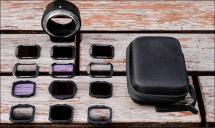
It allows to keep PV going, with more focus towards AI, but keeping be one of the few truly independent places.
-

 sa9220.jpg800 x 477 - 85K
sa9220.jpg800 x 477 - 85K -
PR
Aurora Aperture Inc. today has introduced a revolutionary filter system, the Aurora Aperture Adapter Mount Format (AMF) filter for mirrorless mount adapters.
The AMF filters drop into mirrorless camera mount adapters such as the Canon Mount Adapter EF-EOS R, the Nikon FTZ, the Sigma MC-11 for Sony E, and the Sigma MC-21 for the L mount.
“In 2017 we introduced a rear mount filter system for the Canon EF 11-24mm F4L USM: The Aurora CR format, an industry-first rear mount glass filter,” said Jeff Chen, founder and CEO of Aurora Aperture Inc. “The Aurora Aperture CR format filters solves the problem of needing a huge filter adapter and massive filters for lenses that have protruding front elements. Due to the recent pivot of mirrorless camera development and releases from Canon, Nikon, Panasonic, Sony, and others: We’ve invented the Adapter Mount Format for the mirrorless mount adapters which enables mirrorless camera users to use a single set of filters for all their DSLR lenses regardless of the filter thread size.”
One Mount One Filter
Designed in California, the Aurora Aperture AMF drop-in filters offer many advantages over traditional front–mounted lens filters. Since a drop-in filter goes inside a mount adapter, users only need one set of filters per adapter instead of specific thread sizes for each lens. It not only saves users from having to buy multiple sets of filters or large diameter filters – but it also means awkward to use step-up rings are no longer necessary.
The drop-in filters are very compact and lightweight, meaning that they’re easily carried. They cost much less than traditional front mount filters, especially in comparison to large filter thread sizes.
Any DSLR lens that can be mounted on the four supported mirrorless mount adapters can be used with these drop-in filters, whether the lens has a front filter thread or not. This is especially beneficial for ultra wide-angle lenses without a front filter thread which would otherwise require massive filters on a bulky adapter.
Available Filters
- PowerUV™, a sensor protector filter to shield the camera sensor from contamination
- PowerND™, neutral density (ND) filters of light reduction strength in ND4 (2 stops), ND16 (4 stops), ND64 (6 stops), ND256 (8 stops), ND4000 (12 stops), and ND65000 (16 stops)
- PowerGND™, soft graduated neutral density (GND) filters of light reduction strength in ND3 (1.5 stops), ND6 (2.5 stops), and ND12 (3.5 stops)
- PowerDusk™, a light pollution reduction filter for astrophotography and for cityscape photography in blue hours by reducing artificial light pollution.
- Schott B270® glass is used as the foundation of filters except for the PowerDusk which is based on neodymium glass. Multi-layer nano-coatings are used for light reduction so the filters are able to meet high-resolution demands of 4k/8k video and the high pixel density of modern-day sensors.
A PFPE based nano-coating is applied to both optical surfaces, ensuring the protection of filter against water, oil, dust, and dirt. This coating allows the filter to be easily cleaned as substances do not adhere as easily and are removed with little effort. The PFPE based nano coating has a 110-degree static contact angle, one of the best in the industry.
Aerospace-grade 7051 aluminum alloy is used for the filter frame. This material is practically twice as strong as 6000 series aluminum alloy used in conventional lens filters.
Availability and Pricing
The AMF Filters will be available through a kickstarter.com crowdfunding campaign starting in July 2019. The general public and dealer availability starts in October 2019. The price will start from $44 and goes up to $83 per filter, depending on the type of filter.
Howdy, Stranger!
It looks like you're new here. If you want to get involved, click one of these buttons!
Categories
- Topics List23,991
- Blog5,725
- General and News1,354
- Hacks and Patches1,153
- ↳ Top Settings33
- ↳ Beginners256
- ↳ Archives402
- ↳ Hacks News and Development56
- Cameras2,367
- ↳ Panasonic995
- ↳ Canon118
- ↳ Sony156
- ↳ Nikon96
- ↳ Pentax and Samsung70
- ↳ Olympus and Fujifilm101
- ↳ Compacts and Camcorders300
- ↳ Smartphones for video97
- ↳ Pro Video Cameras191
- ↳ BlackMagic and other raw cameras116
- Skill1,960
- ↳ Business and distribution66
- ↳ Preparation, scripts and legal38
- ↳ Art149
- ↳ Import, Convert, Exporting291
- ↳ Editors191
- ↳ Effects and stunts115
- ↳ Color grading197
- ↳ Sound and Music280
- ↳ Lighting96
- ↳ Software and storage tips266
- Gear5,420
- ↳ Filters, Adapters, Matte boxes344
- ↳ Lenses1,582
- ↳ Follow focus and gears93
- ↳ Sound499
- ↳ Lighting gear314
- ↳ Camera movement230
- ↳ Gimbals and copters302
- ↳ Rigs and related stuff273
- ↳ Power solutions83
- ↳ Monitors and viewfinders340
- ↳ Tripods and fluid heads139
- ↳ Storage286
- ↳ Computers and studio gear560
- ↳ VR and 3D248
- Showcase1,859
- Marketplace2,834
- Offtopic1,319






